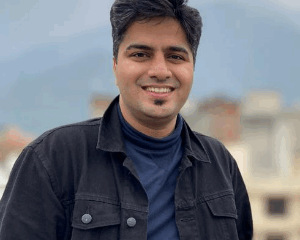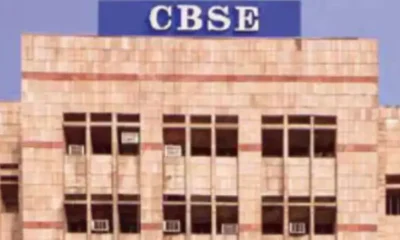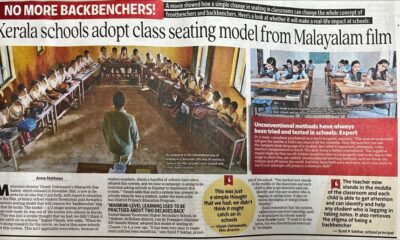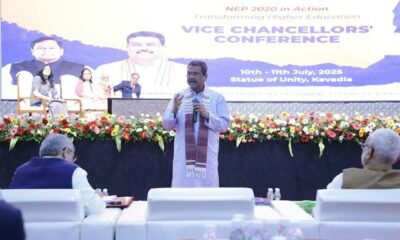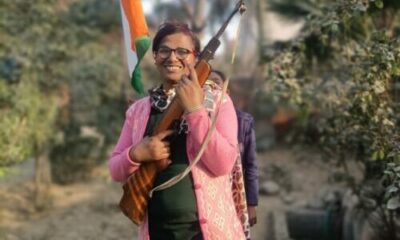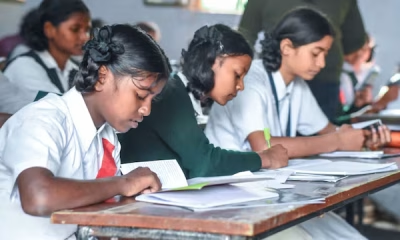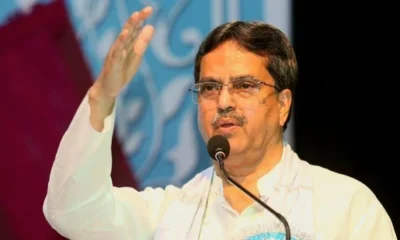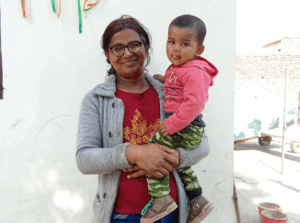Education
PM interacts with students at “Pariksha Pe Charcha 2020” at Talkatora Stadium, New Delhi.
The Prime Minister, Shri Narendra Modi, today, interacted with students as part of Pariksha Pe Charcha 2020 at Talkatora Stadium, New Delhi. 50 Divyang students also took part in the interaction programme. This year too, students from across the country participated in the event.
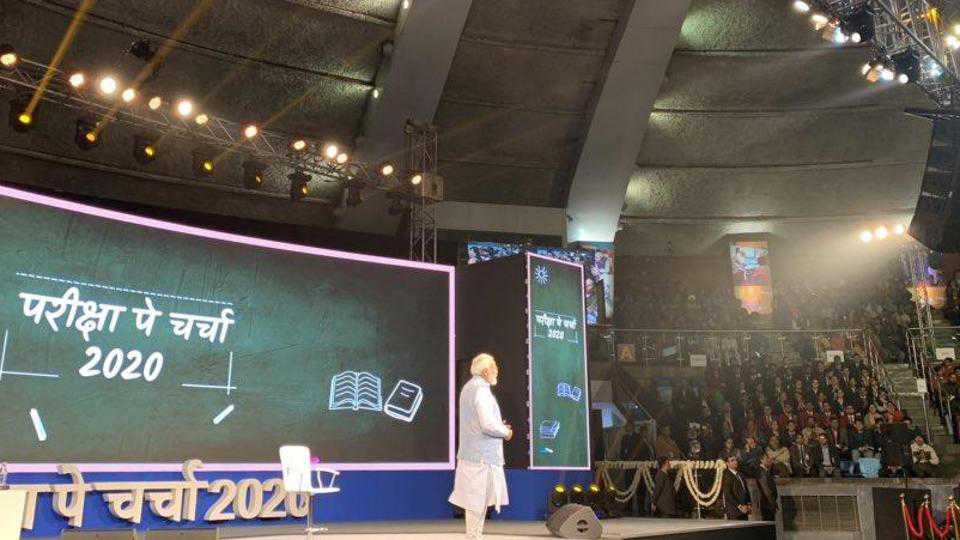
The Prime Minister, Shri Narendra Modi, today, interacted with students as part of Pariksha Pe Charcha 2020 at Talkatora Stadium, New Delhi. 50 Divyang students also took part in the interaction programme. The interaction, which lasted for over ninety minutes, saw students seeking guidance on various issues of importance to them from the Prime Minister. This year too, students from across the country, and also Indian students residing abroad, participated in the event.
At the outset the Prime Minister wished all the students for a prosperous new year and a new decade. Explaining the importance of the decade, the hopes and aspirations of the current decade rest on those kids who are in their final years of schooling in the country.
He said, “In whatever the country does in this decade, those kids who are in 10th, 11th and 12th standards now have a very great role to play. To make the country reach new heights, to achieve new hopes, all this is dependent on this new generation”.
Before beginning the interaction, the Prime Minister said notwithstanding that he attends various events and programmes, the one event which is dear to his heart is the Pariksha Pe Charcha.
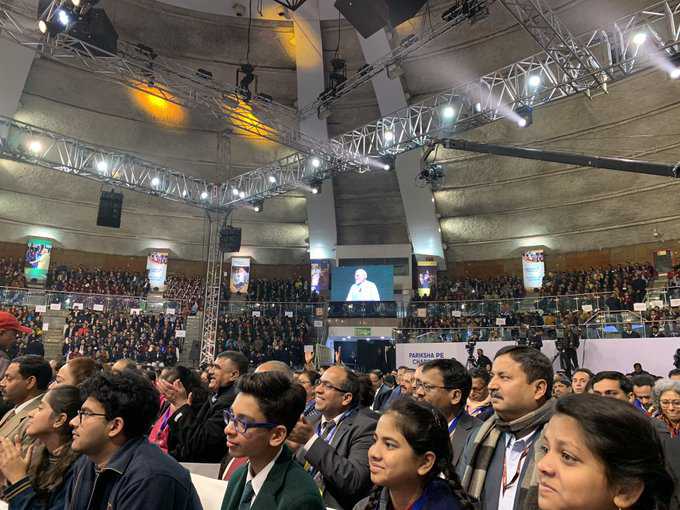
“As Prime Minister one gets to attend numerous types of programmes. You get to learn a lot in such interactions. Each of them provides a new set of experiences. But, if someone asks me about the one programme that touches my heart the most, I would say it is this Pariksha Pe Charcha. I also love attending Hackathons. They showcase the power and talent of India’s youth”, he said.
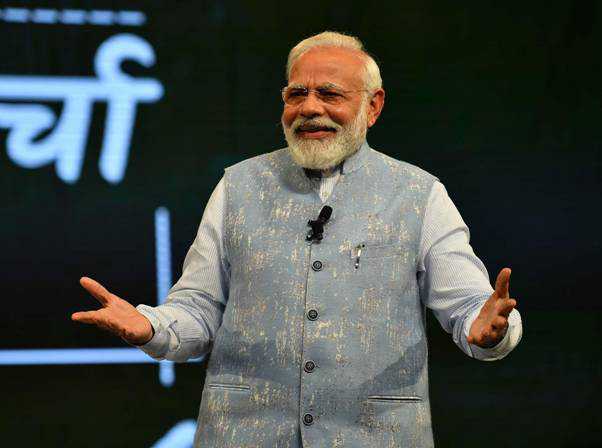
Dealing with demotivation and mood swings:
To a question from a student and losing interest while studying, the Prime Minister said most often students get demotivated due to factors that are external to them and also as they try to attach too much significance to their own expectations.
Prime Minister asked the students to find out the reason for the demotivation and ponder over how to deal with it. He gave the example of the recent issue of Chandrayaan and his visit to ISRO.
“Motivation, demotivation are very common. Everyone goes through these feelings. In this regard, I can never forget my visit to ISRO during Chandrayaan and the time spent with our hardworking scientists.
He said, “We should not look at failures as setbacks or stumbling blocks. We can add enthusiasm to every aspect of life. A temporary setback doesn’t mean that we cannot succeed in life. In fact a setback may mean that the best is yet to come. We should try to convert our distressed situations as stepping stones for a bright future”
The Prime Minister also gave examples of how cricketers Rahul Dravid and V V S Laxman batted in difficult situations during India – Australia match in 2001 to clinch victory for India from the jaws of defeat.
He also talked about how India bowler Anil Kumble bowled to India’s glory notwithstanding his injury.
“This is the power of positive motivation”, he said.
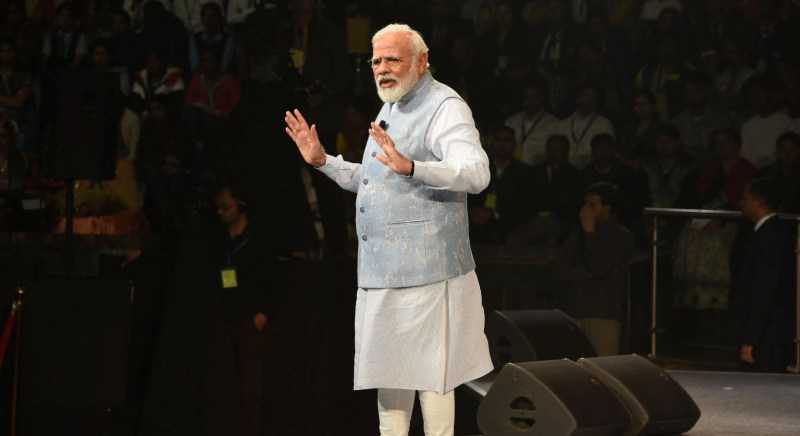
Balancing Extra- Curricular Activities and Studies:
To a question on how to balance studies and extracurricular activities, the Prime Minister said the importance of co-curricular activities in a student’s life cannot be understated.
He said, “Not pursuing extra-curricular activities can make a student like a robot”.
But he also said that that balancing studies and extracurricular activities would require a better and optimal time management by the students.
“Today there are plenty of opportunities and I hope youngsters make use of them and pursue a hobby or an activity of their interest with proper zeal”, he said.
However he also cautioned the parents not to make the extra-curricular interests of their children a fashion statement or a calling card.
“What is not good is when the passion of the children become fashion statements for parents. Extra-curricular activities needn’t be glamour driven. Let each child pursue what he or she likes”, he said.
Whether scores are all that matter:
On a question on how to score marks in examinations and whether they are the determining factor, the Prime Minister said, “Our education system determines our success based on our performance in various exams. Even though we focus our attention on scoring good marks and our parents too, exhort us towards it. “
Saying that there are several opportunities today, he asked the students to come out of the feeling that success or failure at exams determines everything.
“Marks are not life. Similarly examination is not the determining factor for our whole life. It is a stepping stone, an important stepping stone in life. I pray to parents don’t tell them that this is everything. If it does not happen, don’t behave as if you lost everything. You can go to any field. There are umpteen opportunities”, he said.
Exams are important, but exams are not life. You should come out of this mind-set, he said.
Importance of Technology in Education
To a question on the importance of technology and its use in education, the Prime Minister said,
While asking the students to keep themselves updated with the latest in technology, the Prime Minister also urged them to be careful of the perils of its misuse.
“Fear of technology is not good. Technology is a friend. Merely knowledge of technology isn’t enough. It’s application is as important. Technology is a part of our daily lives, but if we misuse it, it robs our valuable time and resources”, he said.
Rights Vs Duties
To a question on what are the rights of the students and on how to make the citizens aware of their duties, the Prime Minister said that an individual’s rights are embedded in his duties.
Giving an example of a teacher, he said, if a teacher performs his duties then he is fulfilling the rights of the students.
Referring to what the Father of the Nation opined on the issue, the Prime Minister said, “Mahatma Gandhi said that there are no fundamental rights but fundamental duties”.
“Today, I am talking to students who would be playing a key role in India’s development in 2047, when we mark a hundred years since independence. I hope this generation takes it upon themselves to act on some of the Fundamental Duties enshrined in our Constitution”, he said.
How to deal with pressure and expectations from parents and teachers?
On how to deal with the pressure and expectations from parents and teachers, the Prime Minister urged the parents not pressurize the students but to pursue with them.
“The way ahead lies in pursuing, not pressuring children. Inspire children to do things that bring out their inner potential”
Best time to study and blanking out during the exam and Fear of Board Exams
On a question on what is the best time to study, the Prime Minister advised that ample rest is as important as the study itself.
He said, “While mind is as fresh early in the morning as the sky after rain, one should only follow that routine in which one is comfortable”
On the issue of sudden blanking out during exams, the Prime Minister asked the students to be thorough in their preparation.
“I would urge students to be confident about their own preparation. Do not enter the exam hall with any sort of pressure. Do not worry about what others are doing. Have faith in yourself and focus on what you’ve prepared”, he said.
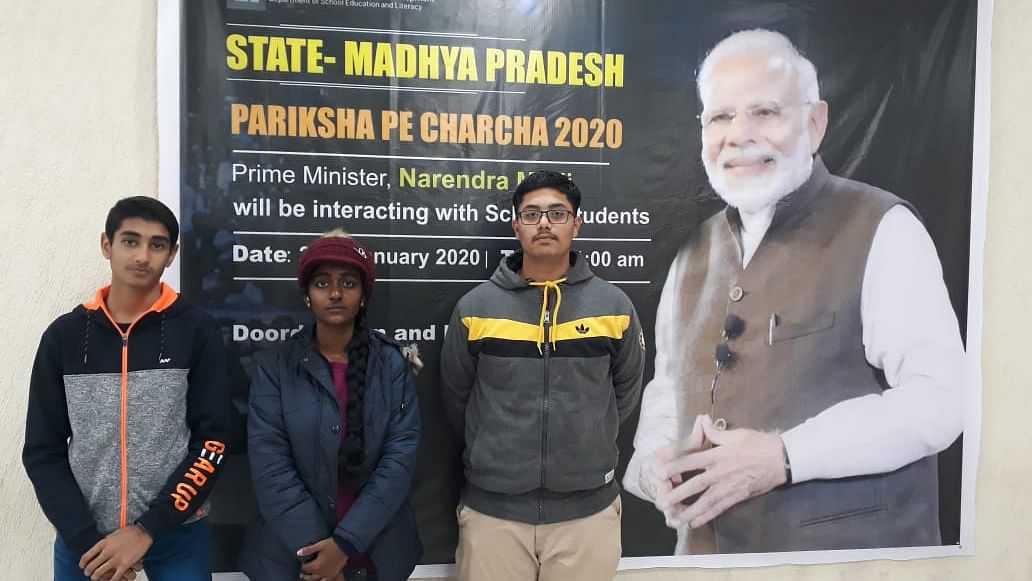
Future Career Options
On the subject of future career options, the Prime Minister asked the students pursue their heart and work with zeal to deliver for the nation and its development
“Careers are very important, everyone has to take some responsibility. We can always contribute to the nation while delivering our responsibilities”, he said.
Online competition in ‘short essays’ was launched for students of classes 9 to 12 for the third edition of Prime Minister's Interaction Programme "ParikshaPeCharcha 2020”. The entries for the competition were invited online from 2nd December, 2019 to 23rd December, 2019 through www.mygov.in More than 3 lakh children registered themselves out of which over 2.6 lakh students participated in the competition. 1.03 lakhs students had participated in the competition in 2019. Selected winners attended Pariksha Pe Charcha 2020 and interacted with Prime Minister Shri Narendra Modi.
A painting and poster making competition were held on exam related issues for CBSE & KVS school students and around 725 posters and paintings were received. Around 50 were selected and exhibited before the Prime Minister during the Pariksha Pe Charcha 2020.
Education
A School Without Walls: The Pehchaan Story, Led by Akash Tandon
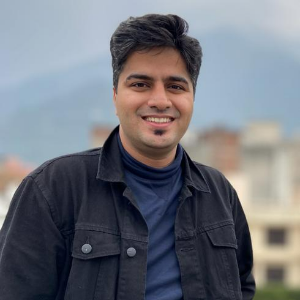
Sometimes the biggest change begins with the smallest act — a few mats on the ground, five curious children, and a group of young volunteers refusing to look away.
In the heart of Delhi, just steps away from the WHO headquarters and the grandeur of Lutyens’ Delhi, an open drain separates two vastly different worlds. On one side: embassies, privilege, policy. On the other: a slum of over 10,000 people, where childhood is often lost to labour, illness, and invisibility.
It’s here that Pehchaan — The Street School — took root.
“We knew we couldn’t change the world. But we could change someone’s world.”
For co-founder Akash Tandon, Pehchaan wasn’t part of a five-year plan. It was a response. A moment of reckoning, watching children play in a toxic drain, unaware of the danger. “This isn’t water,” they told the kids. “It’s poison.” The kids laughed.
That laugh stayed with them.
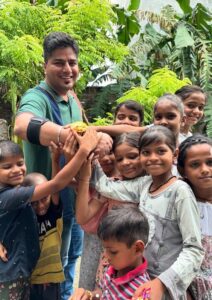
So Akash and his friends returned. Not with speeches or slogans — but with notebooks, mats, and the stubborn belief that every child, no matter their address, deserves to learn.
What started as a weekend effort with five students has now grown into a network of 10 centres, reaching over 1,600 children. And yet, Pehchaan remains fiercely grassroots — no paid staff, no office, no formal backing. Just a living, breathing movement powered entirely by volunteers.
Education That Heals
Pehchaan doesn’t just teach. It listens. It adapts. It believes that the first step to learning is dignity — and that means personalised mentorship, trust, and a curriculum that sees the child beyond the textbook.
Children are grouped into three learning tracks: those already in school who need support, dropouts looking to rejoin, and first-time learners who’ve never stepped inside a classroom. The model is lean but layered — with low student-volunteer ratios, personalised goals, and modules that blend academics with life skills.
There’s dance, storytelling, debate, and painting. There’s coding and digital literacy. And there’s space to be seen.
“My school encouraged me to sing, speak, perform,” says Preeti Adhikari, a longtime Pehchaan volunteer. “These children deserve that too. Because it’s not just about marks — it’s about confidence.”
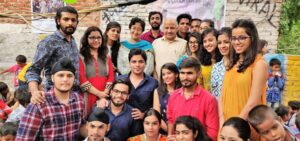
From Drain to Degree
One story stays close to Akash’s heart.
A boy joined Pehchaan in Class 3. He faced pressure to drop out and start working. But he stayed. Pehchaan gave him academic support, counselling, and community. He completed Class 12 with 86%. Then cracked the Delhi University entrance exam.
But the resistance didn’t stop. “What will you earn from books?” neighbours asked. Still, Pehchaan raised the funds, got him into college — and today, that boy teaches at the same centre where he once sat as a student.
“He’s the proof,” Akash says. “That this works. That this matters.”
A System That Runs Without a System
Despite being volunteer-run, Pehchaan operates with the discipline of a corporate team. Every 10 teaching assistants report to a centre head. Weekly reports are filed. Interns handle HR, design, digital media, and curriculum — all without salaries.
In 2024 alone, 8,000+ interns from 75+ colleges joined hands with Pehchaan. Many now lead verticals, train others, or launch their own community learning spaces.
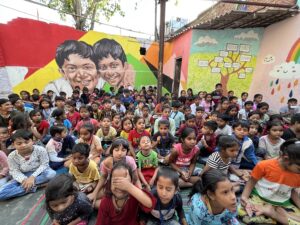
“Earlier I taught five kids,” one intern said. “Now I’m hiring 30 volunteers who each teach five. That’s impact at scale.”
The community, too, is beginning to notice. Blanket drives, nutrition partnerships, and the newly launched Digital Literacy Lab — built with scrap funding and donated laptops — have brought a sense of permanence to the pop-up classrooms.
But the hardest barrier? Still parents.
“You show up for 10 years — then they believe you.”
Convincing slum families to send their children — especially girls — to informal schools was a long battle. Many children still get married by 14. Others are pushed into work.
But when the same group of volunteers keeps returning, year after year, in sun, rain, or smog — trust begins to grow. “We’ve moved beyond convincing now,” Akash reflects. “We’re building the next layer. It’s about dignity.”
Girls who once never stepped outside now give public speeches. Boys once caught in addiction now mentor others.
Akash is clear about the goal: “We don’t want to go pan-India. We want 50 other Pehchaans to emerge. That’s how you scale — by letting go.”
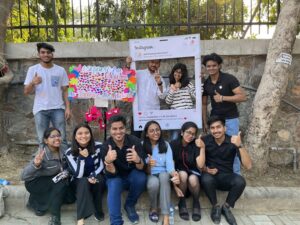
Read the full story in our latest issue, Teacher Warriors 2025.
Education
CBSE Requests Affiliated Schools to Host NIOS Public Exams in October–November 2025
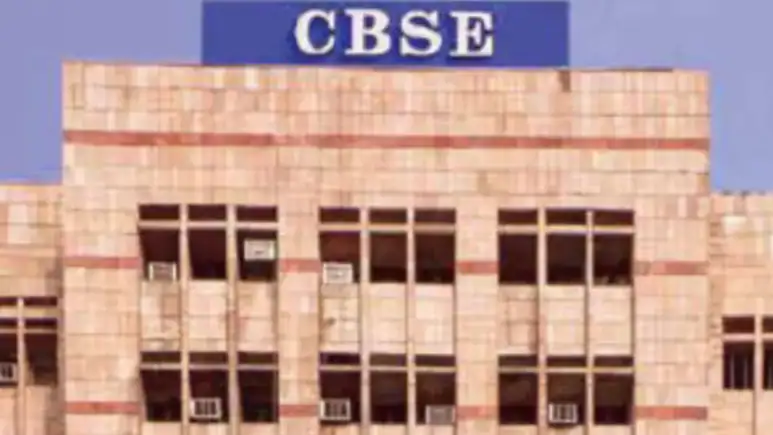
The Central Board of Secondary Education (CBSE) has called on its affiliated schools to assist with the conduct of the National Institute of Open Schooling (NIOS) public examinations scheduled for October–November 2025.
In a recent official communication addressed to principals and heads of schools, CBSE emphasised that NIOS requires infrastructural and logistical support to conduct its biannual board examinations, which include assessments for Class 10, Class 12, and various vocational courses.
“The next Public Examinations of NIOS are scheduled to be held in October–November 2025,” the notice stated, adding that CBSE-affiliated institutions have historically played a key role in enabling NIOS to run its exams smoothly.
Schools willing to extend support have been asked to register their intent on the official NIOS website at https://exams.nios.ac.in under the section: Examination Centre > Register Now.
NIOS operates under the Ministry of Education and is the country’s largest open schooling body. It caters to learners from diverse backgrounds, offering flexibility in learning and examination schedules, especially for students who may be outside the traditional school system.
“Your assistance will help NIOS in holding Public Examinations of its learners,” the CBSE notice concluded, underlining the collaborative nature of this effort.
By participating in this initiative, CBSE schools are not only supporting a national mandate for inclusive education but also contributing to educational equity by helping millions of NIOS learners access fair and organised exam environments.
Education
When AI Reaches the Top of Bloom’s—and Our Students Are Left Behind

We often talk about how AI is transforming education, but are we talking enough about what it’s quietly taking away?
CREATIVITY
As Sir Ken Robinson often reminded us,“Creativity is as important as literacy.”
And yet, in a system so focused on marks, rubrics, and outcomes,creativity is often the first thing we sacrifice.
Bloom’s Taxonomy places Creating right at the top,but in many classrooms today, it feels like AI has reached that level faster than our students have.While children are still figuring out sentence structure and grammar, AI is already generating poems, paintings, and polished presentations with a single click.
Which brings us to a deeply uncomfortable question:
What happens when AI starts to “create”?
And more importantly—what happens when our students stop?
Today’s AI isn’t truly creative.It mimics. It reuses. It draws from patterns and reproduces what’s already been done.And if we don’t pause now to protect what’s uniquely human,we risk raising a generation of students who know how to use tools,but don’t know how to think.
Everything’s Starting to Look the Same
I’ve seen it. You’ve probably seen it too.
Creative writing tasks that sound strangely uniform.Artwork that feels formulaic.Presentations that are polished, yes, but empty.AI has democratised access to intelligence,but in doing so, it has started to flatten creativity.We’re now at a point where students are outsourcing not just answers,but imagination.
But true creativity cannot be prompted.It’s messy. It’s emotional. It’s born out of thinking, feeling, failing, and trying again. It lives in how we interpret the world. In how we care. In how we connect.
How Can We Bring Creativity Back?
We need to bring back the building blocks of creativity.
READ
Let students read more deeply,not just skim or summarise.Let them feel what’s in the pages, get lost in ideas, debate their favourite character in a book or movie, and form their own emotional connections.
EXPERIENTIAL LEARNING
Let’s re-focus on learning through doing,projects, fieldwork, play, nature, making mistakes, working with hands, collaborating, and reflecting.It’s in these non-linear, real-world experiences that creativity quietly blooms.
FINDING THE PURPOSE
We need to pause and ask: What is this child truly passionate about?
It could be animals, gardening, football, art—anything that sparks joy and curiosity.
Once we discover that passion, we can connect learning to it.
Let’s not just ask what they’re reading, but why they’re reading it.
What inspires them? How can that interest help them solve real-world problems?
That’s when learning becomes meaningful,and creativity starts to flow with purpose.
Because by the time they grow up,the world won’t just need people who can use AI – It will need people who can imagine what AI cannot.
Education
No More Backbenchers: How a Simple Seating Shift Is Reimagining Learning
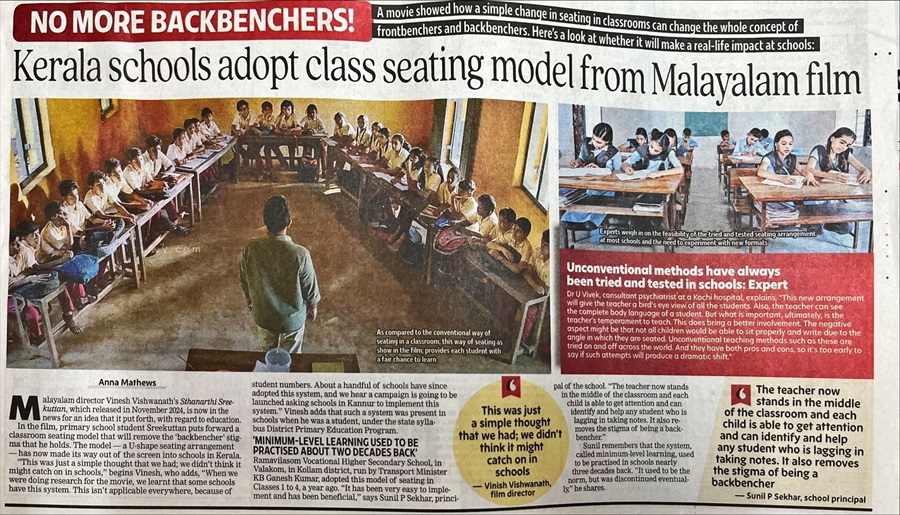
When was the last time you thought about where your students sit? If you think a seat is just a seat — think again.
A simple shift in seating arrangements, sparked by the Malayalam film Sthanarthi Sreekuttan, is inspiring schools in Kerala to break the age-old divide of “frontbenchers” and “backbenchers”. The Times of India recently reported how some schools have begun rethinking how rows of benches shape mindsets — often turning bright learners into passive listeners by default.
Preethi Vickram, Founder of Tapas Progressive Learning, applauded this unique approach online:
The truth is, classroom seating is more than furniture. It’s a mirror of our teaching philosophies. For decades, rigid rows have told students to sit down, face forward, and stay quiet while the teacher talks. One person speaks, everyone else absorbs. But learning doesn’t work in a straight line — it happens in loops, debates, disagreements, and those random questions that make everyone think.
It’s not just an emotional idea — there’s solid science behind it. A 2020 review in Frontiers in Psychology found that classroom layouts directly affect interaction and motivation. The Classroom Direct blog points out that flexible layouts foster collaboration, peer learning, and inclusivity. And a 2022 ESI Conference study noted that traditional seating can create power hierarchies where only frontbenchers thrive.
In India, we know this divide well. Backbenchers are often seen as mischievous or disinterested — but what if they were simply disengaged by design? Many schools still enforce outdated seating rules: girls must sit separately from boys; ‘weak’ students banished to the back; bright ones pushed to the front like prized trophies. But what are we telling children when we make them sit apart based on gender, marks or silence? That some voices matter more than others.
Architects and education designers have long championed a different approach. Rosan Bosch’s designs for Sweden’s Vittra School are modular and playful, showing that space itself can be a teacher. Danish Kurani, an expert in reimagining learning spaces, writes that the biggest mistake schools make is assuming they can modernise teaching methods without changing the physical space: “You can’t have collaborative, project-based learning in a classroom still set up for rows of passive listening.”
Kerala’s small but significant shift is a reminder that big change often starts with small, visible actions. When students sit in circles, clusters, or flexible pods, they are more likely to speak up, listen actively, and learn from one another. It helps break the silent stigma that ‘the back’ means you don’t matter.
Designers like Kurani argue that students should have a voice in how their classrooms look and feel — because when the space reflects curiosity and movement, it encourages the same in young minds. The Studio Schools Trust in the UK, the Reggio Emilia approach in Italy, and Big Picture Learning schools in the US all prove that flexible, student-centred learning environments are not “alternative” anymore — they’re the future.
And this shift doesn’t need fancy gadgets or big budgets. It’s the lowest-cost ‘edtech’ upgrade schools can make: moving a few benches, opening up a circle, creating nooks for quiet work and spaces for loud debate. It tells children: “Your voice matters, wherever you sit.”
In a world that needs more curiosity, connection, and creativity — we cannot afford to let seating stifle learning.
So let’s not just remove the backbenchers — let’s remove the very idea of front and back.
Because when every child feels seen and heard, there are no bad seats in the house.
References: * Classroom Direct Blog, 2021 * Frontiers in Psychology, 2020 * ESI Conference Proceedings, 2022 * Danish Kurani on Common Classroom Design Mistakes
Education
NEP 2020’s Panch Sankalpa to Guide Central Universities: Dharmendra Pradhan
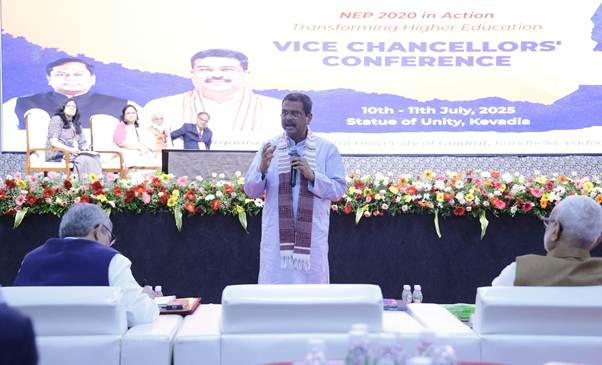
More than 50 Vice Chancellors of India’s central universities gathered in Kevadia, Gujarat for a two-day conference to assess the implementation of the National Education Policy (NEP) 2020 and lay the groundwork for the coming years. Organised by the Ministry of Education in collaboration with the Central University of Gujarat, the conference seeks to align higher education institutions with the broader national vision of Viksit Bharat by 2047.
Union Education Minister Dharmendra Pradhan, addressing the gathering, outlined the Panch Sankalpa of NEP 2020—next-generation education, multidisciplinary learning, innovation, holistic development, and Bharatiya orientation—as the guiding principles for institutional transformation. He emphasised that India’s higher education ecosystem has undergone significant change over the last decade, becoming more flexible, inclusive, and innovation-driven. Student enrolment has increased by 30% since 2014–15 to reach 4.46 crore, with female enrolment growing by 38%. The gross enrolment ratio for female students now exceeds that of males, while enrolment among Scheduled Castes and Scheduled Tribes has also improved. PhD enrolments have nearly doubled, with women registering a 136% increase.
The Minister urged Vice Chancellors to play a transformative role by redesigning curricula, improving digital infrastructure, strengthening faculty training, and promoting multidisciplinary education. He reiterated the goal of raising the gross enrolment ratio in higher education to 50% by 2035, in line with the NEP’s vision. Placing students at the centre of all reform efforts, he called on universities to foster job creators, ethical innovators, and socially responsible graduates.
Pradhan also encouraged institutions to reflect on India’s intellectual heritage while preparing for a global future, invoking the academic “Triveni Sangamam” of celebrating the past, calibrating the present, and creating the future. He recommended that each university prepare a strategy paper to fully implement NEP 2020, incorporating Indian Knowledge Systems, digital skilling initiatives, and campus-led innovations. He proposed that such review conferences be hosted at the campus level to promote decentralised engagement and exchange of ideas.
Dr. Hashmukh Adhia, Chancellor of the Central University of Gujarat, spoke about the six principles of karmayoga and the importance of Indian knowledge systems in shaping individual and collective progress. Dr. Vineet Joshi, Secretary of Higher Education, reflected on the journey since the policy’s launch and reiterated that NEP 2020 imagines universities not as degree-granting institutions, but as ecosystems of innovation, research, and holistic development. Dr. Sunil Barnwal, Additional Secretary, underlined the foundational values of access, equity, quality, affordability, and accountability, and highlighted the importance of stakeholder partnerships in driving reform.
Prof. Rama Shanker Dubey, Vice Chancellor of Central University of Gujarat, reaffirmed that all central universities are committed to advancing the vision of Viksit Bharat through concrete, on-ground measures. The conference, spread over ten thematic sessions, includes discussions on the Four-Year Undergraduate Programme, digital tools like SWAYAM and AAPAR, university governance through SAMARTH, alignment of education with the future of work, and research and innovation frameworks such as ANRF and PMRF. Other themes include equity, internationalisation, faculty development, and the integration of Indian languages and knowledge systems.
Participating universities include Jawaharlal Nehru University, University of Delhi, Tripura University, Central University of Rajasthan, Sikkim University, and many others. The outcomes of the conference are expected to help define the next phase of NEP 2020 implementation, enabling institutions to become more responsive, inclusive, and globally competitive.
Education
Less Than Half of Indian Schools Offer Skill-Based Courses for Senior Students: NCERT Survey
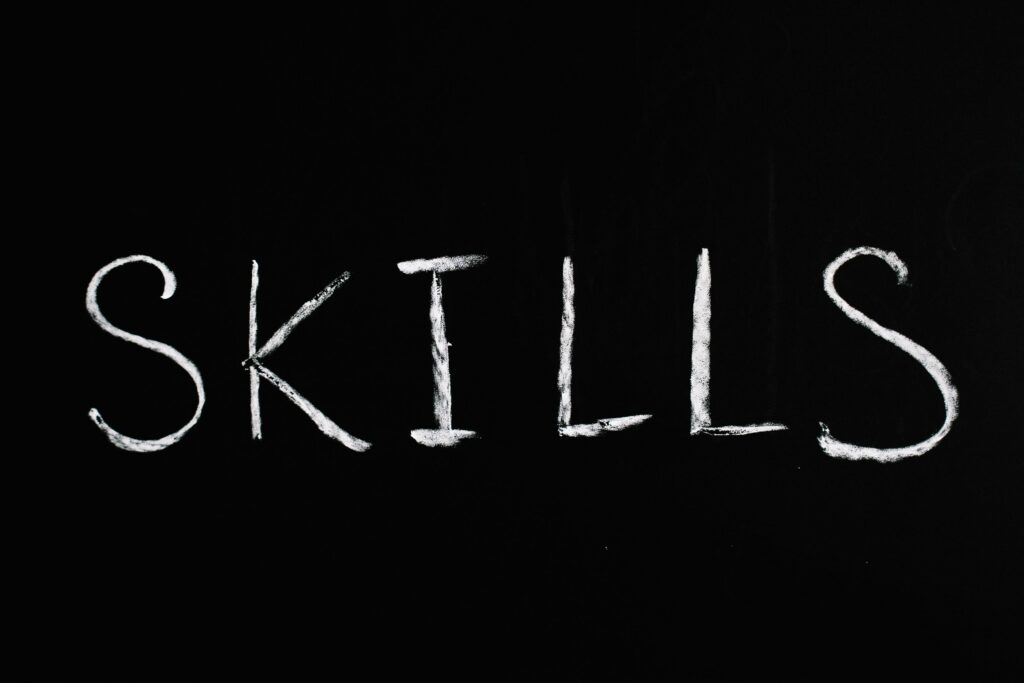
A recent survey conducted by NCERT’s National Assessment Centre has revealed that only 47% of schools across India currently offer any skill-based courses to students in Class 9 and above. This statistic highlights a significant gap in the availability of practical, job-ready education at the secondary level—an area that India’s New Education Policy has been aiming to strengthen.
The survey also found that student enrolment in these courses is even lower. Just 29% of students in Classes 9 and above have opted for skill-based subjects, indicating the need for better awareness, guidance, and integration of these programmes into mainstream learning.
The courses that are being offered include trending and industry-relevant subjects like Artificial Intelligence, Data Analytics, Digital Marketing, and E-commerce. However, experts believe these numbers are far from adequate in a country with one of the world’s largest youth populations.
At the higher education level, there is a stronger push for integrating skills into curricula. Many skill universities now structure their programmes with a 60% to 70% skill-based component, offering students a blend of theoretical and practical knowledge designed to make them workforce-ready.
The NCERT report recommends that more schools must be brought into the fold of skill education. With the job market rapidly evolving and the demand for digital and emerging technology skills growing, strengthening school-level skill education can bridge the gap between academic learning and real-world employability.
Building robust vocational streams in schools could also help address the challenge of students dropping out after secondary education due to a lack of clear pathways into meaningful careers.
Education
The Woman Who Refused to Disappear – Aditi Sharma’s Quiet Fight for Education
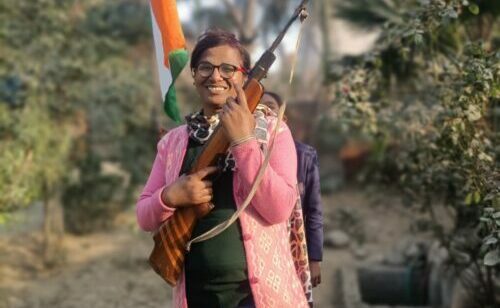
In a quiet corner of Karnal, Haryana, Aditi Sharma runs a small school for underprivileged children. She is the founder, principal, and often, the only teacher. As a transgender woman in North India, her journey has been marked by resistance and isolation — but also by unwavering commitment. Her school may lack formal recognition or resources, but it stands as a space of learning, inclusion, and quiet resilience.
Aditi is not just the founder and principal of Haryana Public School. She is also a transgender woman who dared to imagine a different kind of North India — one where prejudice makes way for possibility, and education belongs to everyone.
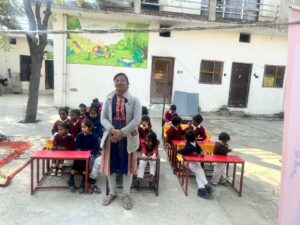
But dreams, she learned early on, come at a cost.
Born and raised in Delhi, Aditi was no stranger to the stereotypes that shadow the transgender community.
“Even educated people carry the assumption that all trans people beg or perform ceremonial rituals. That’s the stereotype I grew up seeing around me,” she says.
It disturbed her and lit the fuse of quiet rebellion.
Leaving Delhi behind, she moved to Karnal with one goal: to build a school not just for visibility, but for children who had nowhere else to go. Her father, unaware she had come out, gave her a 1,200-square-yard plot to build on. “At the time, I hadn’t fully come out. Had they known I was transgender, they wouldn’t have named it to me.”
What she built wasn’t just a school — it was a statement.
In the beginning, there were no teachers, no steady funds, and no blueprint. “I doubted whether I could run a school at all. I had no confidence. But slowly, a few children started coming in. Then a few more. At one point, we had 60–70 students.”
That number dropped, not due to a lack of dedication, but constant harassment. Neighbours let their dogs loose outside. Parents were warned, “Why send your child there? This isn’t a real school.” Some believed her identity disqualified her from leadership, from teaching, from existing with dignity.
She persisted anyway.
Aditi never set out to run a school for underprivileged children. It wasn’t a strategic choice or a targeted mission. It was simply what remained when everyone else walked away. Families who could afford higher fees refused to send their children to a school run by a transgender woman. Teachers quit under social pressure. So she opened her doors to those who had nowhere else to go — children whose families could pay ₹100 a month, sometimes just ₹50, and often nothing at all. “If they don’t learn here, they won’t learn anywhere,” she says. And so she teaches — not because it’s easy, but because no one else will.
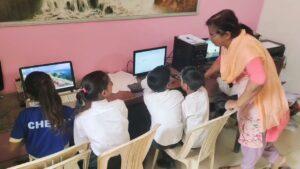
Her day begins at 4 AM — cleaning, prepping, sourcing supplies. By 8 AM, she’s teaching English, guiding students through computing tasks, or painting with them on borrowed desktops. She buys second-hand books herself. There are no permanent staff members. Most teachers leave within weeks. “They say, ‘My family doesn’t want me working here.’ The social pressure is immense.”
Once, a neighbour handed her a one-day-old baby and walked away. Aditi cared for her. When the child fell ill, she spent 12 days at the hospital with her — and the other children. Alone. “They don’t speak to me anymore,” she says of her family. “I’ve learned to let go. If someone doesn’t want to stay in touch, that’s okay. You still have to be happy.”
Haryana Public School is still not recognised by the state government. Despite its large plot, authorities claim she doesn’t meet the criteria. “Other schools on smaller land get recognised,” she says. “But because I’m transgender, they say no.” Her case is currently being reviewed by the Human Rights Commission. Justice Lalit Batra, in a hearing, reportedly said:
“If she doesn’t meet your current rule, change the rule.”
Meanwhile, the children continue to learn — with donated books, basic tools, and the irrepressible will of one woman. Aditi has even built two giant model airplanes — one stretching 20 feet — from scrap and wood. “They don’t fly, but they spark curiosity. Ten children can sit inside. It makes them dream.”
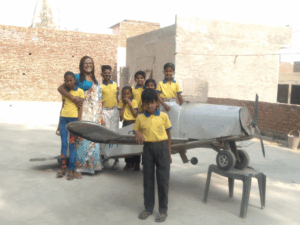
And dreams are something she insists on, even when the world offers no applause. “One child had developmental issues. No school would take him. People told me I was wasting my time. But he deserved a chance.”
Sometimes, appreciation is scarce. Respect even more so. “When parents don’t respect you, neither do their children,” she admits. “When your own life is a constant struggle, it becomes hard to build emotional bonds.”
But she still shows up every day. Reporters ask why so many people visit her school. “Because we’re doing something that shakes the norms,” she tells the children. “This school is special.”
And they believe her. Because children don’t discriminate. Adults do.
Her message to the transgender community is clear:
“Don’t wait for society to accept you. Build your own path. Even if you’re the only one walking it.”
Aditi Sharma may be the only openly transgender woman in North India running a school. But she’s not asking for sympathy. Just space. Just dignity. Just the right to show up — and not disappear.
“Even if only one child comes,” she says,
“I’ll keep the doors open.”
Read the full story in our latest Teacher Warriors issue: https://scoonews.com/magazines/scoonews-june-july-2025-digital-edition/
Education
A Vision Beyond Sight – How Aarti Takawane is Rewriting Futures for Blind Girls
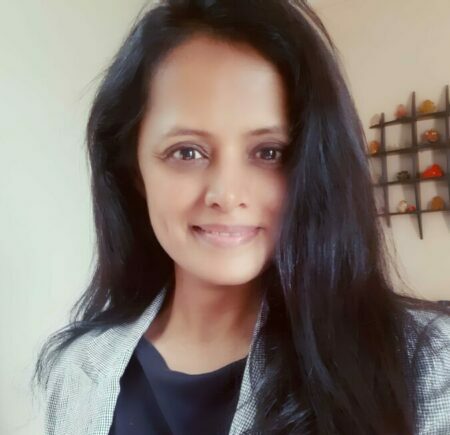
Sometimes, the most extraordinary journeys begin with an ordinary restlessness — that nagging sense that comfort isn’t enough. For Aarti Takawane, that quiet realisation led her to walk away from a secure corporate job, and towards a mission she never imagined for herself.
Aarti’s early career looked like everything most people might aspire to: a steady job, good salary, and the kind of stability that makes parents proud. But deep down, she felt a pull that numbers and meetings just couldn’t satisfy. With a background in psychology and a genuine desire to help others, she always knew her purpose lay in people, not just profit.
That spark turned into a flame when she met Mrs Meera Badve, founder of Niwant, an organisation supporting blind students in higher education. A casual encounter at a social event became a life-changing conversation. Aarti took a leap of faith and began volunteering at Niwant — and for the first time, she felt what it was like to make an impact where it truly mattered.
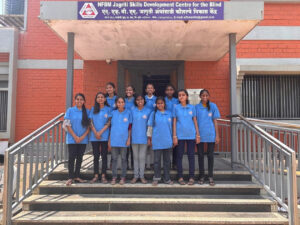
Her path eventually led her to the National Federation of the Blind’s Jagriti School for Blind Girls in Pune — a place that today houses 110 blind girls, 99% of whom come from rural areas. Here, the girls don’t just study; they live, learn, and grow together in an environment that believes in what they can do, rather than what they can’t.
When Aarti joined Jagriti, she began as a psychologist, focusing on the social and emotional development of the girls. But the more she listened to their dreams and struggles, the more she saw the barriers waiting for them after school. “When you give them the right tools, you’re not just giving them a skill — you’re giving them back their choice,” she reflects.
Visually-challenged girls face a stark reality once they step out into the world. Apart from limited government quota jobs in banks or insurance, there were few opportunities that truly matched their abilities. So, Aarti decided to do something about it.
“True empowerment means they can live with dignity, not just survive.”
She founded the Skill Development Centre inside Jagriti School — a space where blind girls could learn practical, job-ready skills that tap into their real strengths. Many of the students have remarkable listening and verbal abilities. So the Centre offers courses that play to these strengths: voice modulation, foreign languages, recruitment training, and more. There are also classes in computer literacy, digital accessibility testing, and even coaching for competitive exams.

But the real magic lies in how the Centre stays rooted in reality. The team works closely with organisations like Vision-Aid India and inclusive employers to keep training aligned with what the industry actually wants. Each student’s strengths and interests are mapped out with care, so the training feels personal and purposeful.
Equally important is what happens beyond the classroom. Many girls arrive at Jagriti shy, anxious, or unsure of themselves. They may have never used a screen reader, travelled alone, or spoken up in public. So the Centre pairs technical skills with confidence-building: mobility training, decision-making workshops, life skills, and emotional support.
“They didn’t need sympathy — they needed direction, support and opportunity,”
Funding is always a tightrope act — a mix of donations, CSR partnerships, and the occasional government grant keeps the Centre alive. It covers trainer salaries, hostel facilities, assistive technology, and learning materials. The school is committed to full transparency with its supporters, many of whom return year after year because they can see exactly where their help is going.

Aarti knows that none of this would be possible without the right people leading the way. Every teacher or trainer goes through orientation in assistive technology and inclusive education. Sensitisation workshops and regular feedback from students make sure the environment stays supportive and respectful.
As the world changes, so do Aarti’s dreams for the Centre. She hopes to introduce advanced digital modules, remote work training, and a stronger network of inclusive employers. But what excites her most is the chance to rewrite how society sees disability, not as a barrier, but as a different kind of potential waiting to be unlocked.
For the 110 girls who call Jagriti School home, Aarti Takawane is more than just a teacher. She’s proof that sometimes, the best things really do happen by accident — and that true vision is not about what we see, but what we choose to do about what we can’t.
Read the full story in our issue of Teacher Warriors 2025 at https://scoonews.com/magazines/scoonews-june-july-2025-digital-edition/
Education
UP Govt Launches Astro Labs in Government Schools to Boost Scientific Learning
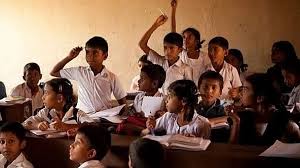
Under the leadership of Chief Minister Yogi Adityanath, the state is rolling out astro labs in government schools at the block level, aiming to strengthen scientific thinking and curiosity among school children, especially in rural areas.
According to a statement issued by the government, these labs—named Amrit Kaal Learning Centres—are being developed through a public-private partnership (PPP) model and are already operational in several districts.
The initiative is designed to give students access to real-time, hands-on learning experiences using tools like Dobsonian telescopes, VR headsets, microscopes, light experiment kits, and anatomical models. These tools go beyond textbook learning, allowing students to explore astronomy, gravity, light, and the physical world through direct experimentation.
Officials say the initiative has already made significant impact. In Ballia district, for example, science labs have been established in all 17 blocks to make science more engaging and inquiry-driven.
Ballia District Magistrate Mangla Prasad Singh said the labs are aligned with the state’s broader goal of making science accessible and meaningful. “These labs are designed to foster experiential and inquiry-based learning,” he noted.
Chief Development Officer Aojaswi Raj added that each lab costs between ₹2.5 to ₹3 lakh, including both the equipment and teacher training. The inclusion of orientation sessions, video guides, and mentorship support for teachers ensures that the labs are used effectively in classrooms.
“These labs have sparked genuine curiosity among children, who now ask questions, observe the night sky, and explore concepts far beyond the standard curriculum,” said Raj.
The program is part of a larger effort to bridge the gap between urban and rural education. With access to advanced tools and teacher support, children in villages are beginning to imagine careers in space science, inspired by stories like that of Indian-origin astronaut Shubhanshu Shukla.
The UP government hopes this initiative will help build a future-ready generation, where aspiration is not defined by geography, and the boundaries of scientific exploration begin right from the classroom.
Education
Class 3 Learning Levels Show Gains Since Pandemic, But Still Below 2017: PARAKH Survey
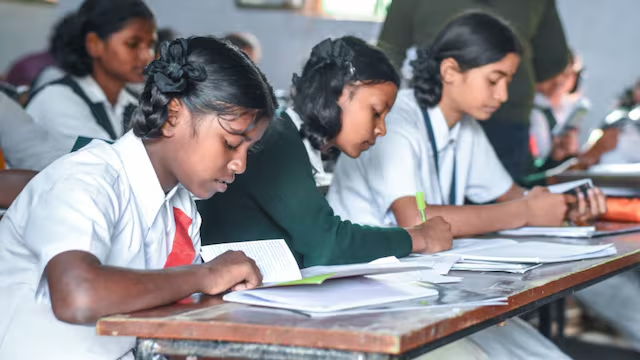
According to the government’s latest PARAKH Rashtriya Sarvekshan report released on Monday, Class 3 students across India have yet to return to pre-COVID academic levels. The survey, conducted in December 2024, covered more than 21 lakh students from Classes 3, 6, and 9 across 74,229 schools, offering a large-scale snapshot of student learning recovery after the pandemic.
Among the three grades, Class 3 is the only one surveyed in all three rounds (2017, 2021, and 2024) — allowing for direct comparison. While there has been an uptick in scores since the 2021 assessment, they remain below the national average recorded in 2017.
In 2024, Class 3 students scored an average of 64% in language, compared to 62% in 2021 — but still lower than 66.7% in 2017. In Mathematics, the score stood at 60%, up from 57% in 2021, but below the 63% recorded in 2017.
Students were found to struggle the most in reading short stories and understanding them (60%), while performing best in everyday language usage (67%). In Maths, the lowest scores came in geometry and money concepts (50%), with the strongest performance in identifying basic shapes and number patterns (69%).
The survey’s structure is aligned with the National Education Policy (NEP) 2020, which breaks school education into four key stages. Class 3 marks the end of the Foundational Stage, making it a crucial checkpoint for basic literacy and numeracy.
Classes 6 and 9: Scores Below 50% in Most Subjects
Students in Classes 6 and 9 showed average scores below 50% in all subjects except language, suggesting that older cohorts may be bearing the brunt of prolonged learning loss from pandemic-related school closures.
A senior official from the Ministry of Education noted that these grades missed nearly two full years of classroom instruction during a critical developmental period. Despite visible recovery since 2021, the learning gaps persist.
Why This Matters
The findings serve as a reminder of the lasting impact of the pandemic on India’s school education, especially for early learners. The report calls for targeted learning interventions, curriculum adjustments, and robust teacher support systems to help students recover foundational skills.
With only limited time before students transition into higher stages of schooling, the emphasis is now on accelerated catch-up strategies and deeper diagnostic assessments to address these persistent gaps.
-

 Education2 months ago
Education2 months agoCBSE’s ‘Sugar Boards’ Initiative: Tackling the Sweet Crisis in Indian Schools
-
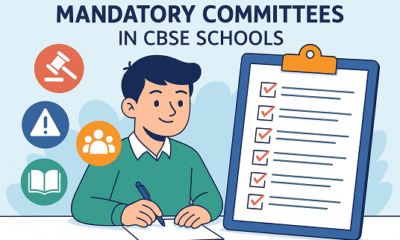
 Education3 months ago
Education3 months agoIs Your School Following These Mandatory CBSE Committees?
-
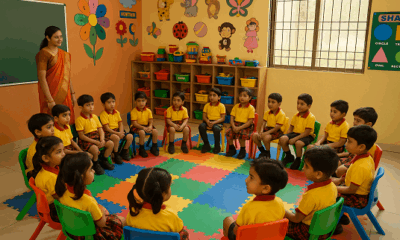
 Education3 months ago
Education3 months agoMaharashtra to Regulate Pre-Primary Education with New Law Aligned to NEP 2020
-

 Education3 months ago
Education3 months agoMAHAJYOTI’s Book Distribution Scheme to Empower 7,000 OBC Students Preparing for JEE/NEET & MHT-CET
-
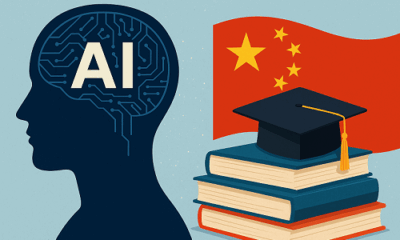
 Education3 months ago
Education3 months agoChina Embarks on Ambitious AI-Driven Education Reform to Build a ‘Strong Education Nation’ by 2035
-
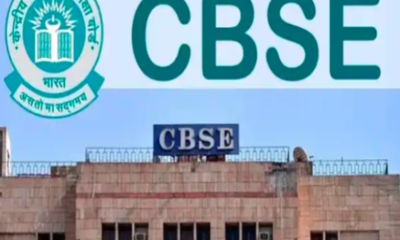
 Education3 months ago
Education3 months agoCBSE Introduces Mandatory Bridge Course for Classes 6 to 12 in Chhattisgarh Under NEP 2020
-
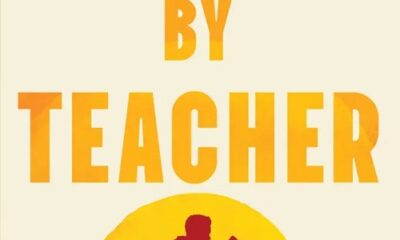
 Education2 months ago
Education2 months agoJohn King’s Book ‘Teacher By Teacher’: A Global Tribute to the Transformative Power of Education
-
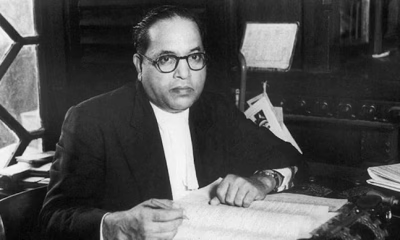
 Education3 months ago
Education3 months agoRewriting Ambedkar: Why Students Must Know the Man Beyond the Constitution
-
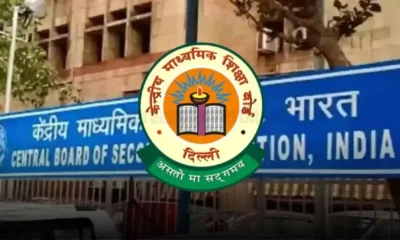
 Education3 months ago
Education3 months agoCBSE Mandates 50-Hour Annual Training for Teachers, Declares STEM as 2025 Theme
-
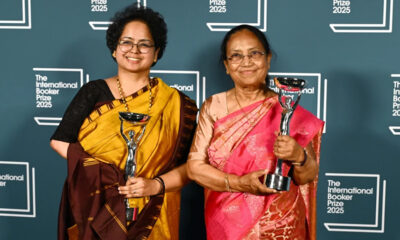
 Education2 months ago
Education2 months agoBanu Mushtaq’s International Booker Win Is a Wake-Up Call for Indian Schools to Reclaim Literature




